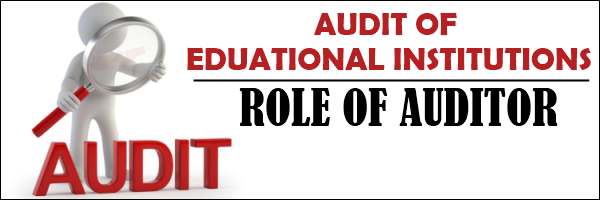Audit of Educational Institutions | Role of Auditor
Table of Contents
Audit of Educational Institutions
The auditor may thoroughly study the trust deed of the trust to which the school or the college belongs and in the case of the audit of an University, he may study the Act of Legislature and the rules that are applicable to that university.

The institution may receive the following:
1. Grant from government, local authority or governing bodies.
2. Legacies.
3. Donation in cash and in kind.
4. Income from Investments.
5. Admission fees, Tuition fees, Hostel fees etc.
6. Fines and penalties.
7. Contribution towards specific fund.
8. Rental income etc.
Records to be verified by Auditor in Educational Institutions
To verify the above, the auditor may examine the following books and records:
1. Minutes of the managing committee.
2. Students’ fees Register.
3. Cash Book and counterfoils of receipts for fees, caution deposit, fine etc.
4. Rental and Lease agreements.
5. Correspondence and other documents relating to legacies, grants etc.
Role of an Auditor in Audit of Educational Institutions
While examining the above records, the auditor has to ensure the following:
1. He shall evaluate and confirm the effectiveness of internal check system of accounting of the receipts.
2. He should verify that the fees are collected from all the students and if there is any concession, the same is granted by a person who is so authorized.
3. He should also ensure that the fees received in advance and fees receivable are properly accounted and irrecoverable fees are written off under the authorization of the appropriate person.
An auditor may ensure the following while verifying records of Educational Institutions:
1. that the admission fees are credited to capital fund A/c.
2. that the fines and penalties are collected after due authorization and accounted properly.
3. that a separate register is maintained for caution deposit received from students and the refund due out of caution deposit is refunded to the students.
4. that long outstanding tuition fees, hostel fees etc., are periodically reviewed and reported to the management for further action.
5. that the funds created for specific purpose are maintained separately, the investments representing such funds are kept separately and the surplus income from such funds are accumulated and invested along with the capital fund maintained for the purpose.
6. that the amounts that are refundable to the students are shown as liability in the Balance sheet.
7. that all the capital expenditure are approved by the managing committee.
8. that the internal control procedure relating to purchase of stationery, provisions, clothing and other items are effective and chances of pilferage and fraud are minimum.
The auditor may verify all the expenditure in the usual manner and examine the payment out of funds created for specific purpose thoroughly and ensure that the receipts and payments out of this funds are accounted and presented separately in the Balance Sheet.
